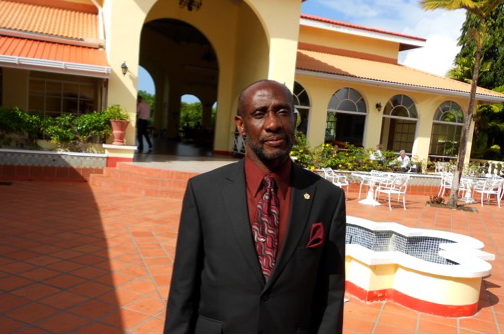By Alexander Britell
GRENADA – The seventh UK-Caribbean Forum that met in Grenada this weekend looked at a range of areas of cooperation as the Caribbean and the UK open up a “new and more modern relationship” going forward. As part of a series of interviews with leaders at the Forum, Caribbean Journal spoke to St Kitts and Nevis Foreign Minister Sam Condor (who is also the country’s Deputy Prime Minister), the Forum’s Co-Chair, about cooperation with the UK, tackling climate change and the development of geothermal power in the twin-island federation.
What were the major points of discussion with the UK?
I think it was open, frank discussion. The issues that we discussed – APD [air passenger duty] is a major concern for us. As you will be aware, most of our countries are tourism-based, and it’s the main economic activity for most of our countries. So this tax, we think, will affect us greatly. We understand that the British government will have their own fiscal policy, and their own agenda, but we’re looking at the implementation to make sure it is fair and non-discriminatory. We believe that there is some element of that to look at and make sure that travel to other parts of the world are not put at an advantage over us.
What were some of the other issues you talked about?
We’re looking at economic resilience, which is a major concern for us. With the recent financial problems around the world, we’re looking to rebuild our economies and looking to make sure that the institutions that we have been interacting with, like those in the United Kingdom and Europe, give us an opportunity. So we’re looking at the EPA [Economic Partnership Agreement] and making sure that they don’t affect us negatively. We’re looking at the EU partnership development policy, and asking them that they look to make sure that they take into consideration our small size and vulnerability in terms of natural disasters, and on issues like climate change.
Speaking of climate change, how much is that a priority for your Ministry?
It’s a serious problem for everyone around the world, something that is affecting the world in a really negative way. So that is a major concern. In Durban, [the climate conference] didn’t go as well as we would have liked, but it was s step in the right direction. Like the Foreign Secretary [William Hague] said, Grenada played a role in terms of the policies, and they’ve been doing a great job. But it’s something that we want to focus on as well. Renewable energy is a major issue for us, and we want to make sure that we’ll be able to keep competitive. Energy costs are a serious problem.
How would you ultimately characterize the talks?
They were wide-ranging discussions. We talked about cultural issues, intellectual property – even the Olympic Games in London this year, where we hope to showcase Caribbean excellence. In fact, we compete with the rest of the world, and it just shows that when we have the opportunity we can be as good as anyone in the world. We have been accustomed in the region of just 5 million people, without including Haiti, to punching above our weight – in the area of development, in terms of healthcare and education, in terms of good governance and democracy and accountability. I think we have been able to change governments here regularly, and without any bloodshed, without any difficulties, and we believe we have lessons to teach the rest of the world. Sometimes we feel that we are being punished for achieving good things – we have been achieving beyond our own needs and capacity – and we have been able to do it because of the relationships we have established with countries like the UK. Of late, this relationship has waned, and we want to revive it – and a big delegation like the UK brought – of high-powered people not only in the public sector but also the private sector – is a way of achieving that. So we’re looking forward to making sure we see good results.
We compete with the rest of the world, and it just shows that when we have the opportunity we can be as good as anyone in the world.”
What are the other main priorities for the Ministry of Foreign Affairs this year?
In terms of foreign policy, we want to use our Ministry in a developmental way. We want to engage bilaterally and multilaterally – and we’ll be focusing on developmental issues.
Recently, Nevis met with Dominica to talk about potentially collaborating on the development of geothermal energy. What kind of progress have you seen on geothermal?
There’s some progress, but it’s going very slowly, because it’s a costly exercise. One problem we have had is being a highly indebted country. So that level of debt to GDP, your ability to borrow and attract funds is very limited. So that is why you have to seek development. And that is the role of the Foreign Ministry – to develop bilaterally and to develop agreements that will assist in the new developmental agenda.
